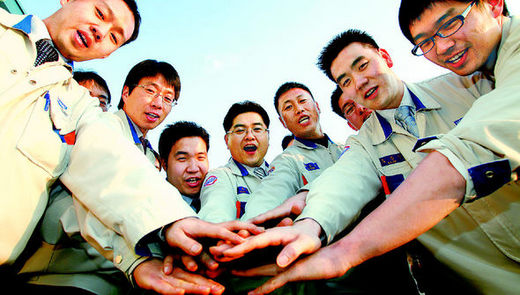Posted on : Jan.12,2007 14:54 KST
Modified on : Jan.13,2007 15:01 KST
 |
|
Employees of JYSolutec.
|
Loss of competitve edge at these firms concerns economists
The slang term "9988" refers to South Korean small and medium-sized enterprises (SMEs), which currently account for about 99 percent of the total number of domestic firms and about 88 percent of the nation’s workforce. These figures seem to indicate that these smaller companies are the nation’s economic superpowers.
However, since the 1997-98 Asian financial crisis, these enterprises have been losing their power and competitive edge. With young job-seekers shunning them in greater numbers, despite their employment of a strong majority of the workforce, small and medium-sized firms are actually suffering from an employee shortage.
Under the current dual circumstances of low growth and low employment, the only way to resolve South Korea’s problem is to strengthen the competitive power of SMEs and to allow them to once again offer high-quality jobs. Woo Chun-shik, a researcher of the Korea Development Institute (KDI), said, "In order to strengthen the base of the industry and to create high-quality jobs, it is necessary to cultivate the smaller companies."
JYSolutec Co. is a good example. A maker of stack molds, founded in 1976, has steadily developed into a company by incorporating advanced IT technology. The company exports about 40 percent of its products to countries including Japan and the United States. Its sales have expanded to 180 billion won (US$191 million) last year from 30.8 billion in 1998 and the company’s staff increased from 200 to 469 during the same period.
Auto parts manufacturer CAP started to develop its products for the world market since the late 1990s. Four years after establishing a technological research center in 2004, CAP developed advanced automobile windshield-wiper blades. The company is supplying products to U.S.-based Wal-Mart, defeating Bosch, the world’s leader in the industry. CAP’s staff grew from 160 in 2004 to 270 last year.
However, such success stories are rare in South Korea. According to a survey conducted by the KDI over situations of about 56,472 small manufacturers between 1994 and 2004, only 25 percent of such firms survived the decade, and only 0.1 percent successfully developed into mid-sized companies.
According to the Korea Institute for Industrial Economics and Trade (KIET), the technology level of Korea’s SMEs is just 75.3 percent of that of fully industrialized countries.
Sources say that the government should pursue policies centered on small businesses, rather than on large companies. Choi Yeong-seop, an official of the Korea Research Institute for Vocational Education & Training (KRIVET), said, "The worldwide major companies adopt a global sourcing strategy by supplying parts and materials to the world market. The government should support the domestic SMEs so that they can deal with such a tendency using proactive measures."
Dean of Yuhan College Kim Yeong-ho stresses a so-called "tiger riding project." Here, the tiger means China. The point of this project is to provide domestically produced materials and components for Chinese exports.
"If we can’t ride the tiger, we will be losers," warned Kim.
The government is aimed at cultivating more than 300 manufacturers of components and materials by 2010 and increasing the number of innovative SMEs to about 30,000 by 2008, from 13,000 in 2005. However, criticism abounds that in this project, the government is stressing quantity rather than quality.
Experts point out that the government should strengthen Korea’s technological base through expanding research and development investment under mid- and long-term goals in order to produce world-competitive SMEs. Choi of KRIVET said that "in the fields in which SMEs cannot afford to invest, the government should further increase investment."
To overcome technological limitations, the nation also can attract foreign technologies and attempt merger and acquisition of foreign companies.
A level of cooperation between industry, the academy, and research bodies should be improved, and companies’ corrupt practices should be corrected, said observers. It is necessary to support people who want to start businesses and to develop regional clusters of innovation, they said.
Please direct questions or comments to [englishhani@hani.co.kr]

